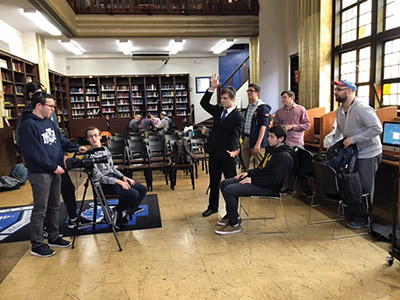
This week, MTA seniors participating in “Names, Not Numbers,” began our interviews of Holocaust survivors after spending time last week practicing our filming and interview skills. I, along with the members of my group, had the privilege of interviewing Gabriella Major and hearing her moving story.
Ms. Major was born in Debrecen, Hungary and when she was two years old, the Nazis came to her town and forced her, her mother and her grandmother into the Debrecen ghetto for four weeks. From there, she was moved to a labor camp in Vienna, Austria for a year, until the Russians liberated them. Ms. Major and her mother walked and hitchhiked all the way back to Budapest, Hungary and there met up with her father, whom had been separated from the rest of the family in the ghetto and brought to a concentration camp. Hearing Ms. Major’s story illustrated exactly why “Names, Not Numbers” is a vital program—because we are the last generation that will have the opportunity to speak with actual Holocaust survivors and hear their stories. Documenting their stories is a way for us to continue sharing them with future generations. Speaking to a survivor imbues you with a certain sense of responsibility to share their story and to combat Holocaust denial. It is our responsibility to stand up against Holocaust deniers to prevent this atrocity from happening again.
Hearing Ms. Major’s story from her in person really moved me in a way that reading it in a book never would. There was a lot more to the interview process than I initially realized. In addition to interviewing Ms. Major, our group members had to rotate between monitoring two different cameras, checking the audio feed and taking notes on the interview itself to pick up on the specific parts we thought were important to include in our final documentary. The hard work and effort was worth it so we can preserve Ms. Major’s story and help her memories live on.










